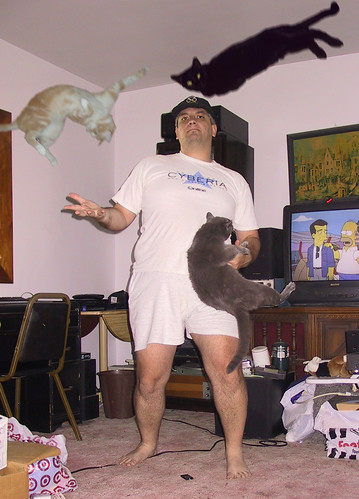Tuesday, March 18, 2008
Arthur C. Clarke
At work today, I heard of the death of Arthur C. Clarke on two national newscasts. Most people will know Arthur C. Clarke as the author of 2001: A Space Odyssey. A fine work, made into an even better movie by Stanley Kubrik, it was certainly something to be remembered for. The two national broadcasts I saw the story on focused on 2001. The two national broadcasts.
Maybe it was because I was sitting in a room where over 1600 different satellite feeds are monitored, 24 hours a day, 365 days a year, but I think that those two national news stories missed on the biggest contribution that Arthur C. Clarke made to humanity.
You may not like science fiction, you may think that 2001 was a baffling motion picture, but you, undoubtedly, have been affected by one of Arthur C. Clarke's ideas,:
Geostationary Orbit
What's so important about this? Satellites. More specifically, communications satellites. The satellites that make phone and telephone transmissions in this country cheap and reliable. The same satellites that make national news broadcasts possible.
It was Arthur C. Clarke's idea. An idea that changed the world. An idea that never earned Clarke a dime.
Even if you didn't like 2001, Clarke's idea touch your life every day. It touches all of our lives.
BOJ
Maybe it was because I was sitting in a room where over 1600 different satellite feeds are monitored, 24 hours a day, 365 days a year, but I think that those two national news stories missed on the biggest contribution that Arthur C. Clarke made to humanity.
You may not like science fiction, you may think that 2001 was a baffling motion picture, but you, undoubtedly, have been affected by one of Arthur C. Clarke's ideas,:
Geostationary Orbit
A geostationary orbit (GEO) is a geosynchronous orbit directly above the Earth's equator (0° latitude), with orbital eccentricity of zero. From the ground, a geostationary object appears motionless in the sky ...
What's so important about this? Satellites. More specifically, communications satellites. The satellites that make phone and telephone transmissions in this country cheap and reliable. The same satellites that make national news broadcasts possible.
It was Arthur C. Clarke's idea. An idea that changed the world. An idea that never earned Clarke a dime.
He described this concept in a paper titled "Extra-Terrestrial Relays — Can Rocket Stations Give Worldwide Radio Coverage?", published in Wireless World in October 1945. The geostationary orbit is now sometimes known as the Clarke Orbit or the Clarke Belt in his honor.
Even if you didn't like 2001, Clarke's idea touch your life every day. It touches all of our lives.
BOJ

